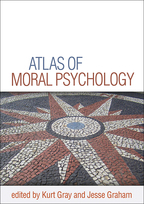Atlas of Moral Psychology
Edited by Kurt Gray and Jesse Graham
HardcoverPaperbacke-bookprint + e-book
Hardcover
orderJanuary 30, 2018
ISBN 9781462532568
Price: $78.00 586 Pages
Size: 7" x 10"
Paperback
orderNovember 15, 2019
ISBN 9781462541225
Price: $52.00586 Pages
Size: 7" x 10"
“The contributors, who include both philosophers and psychologists, are acknowledged experts in the field….Each essay is framed as an answer to a specific question, such as ‘What do we evaluate when we evaluate moral character?’ and both the question and an abbreviated version of the answer are printed at the head of each chapter. This feature makes the book very user-friendly, particularly for students and readers new to moral psychology….Recommended. Undergraduates and above.”

—Choice Reviews
“The tremendous recent growth of interest in moral psychology has yielded no shortage of deep debate and thorny thickets. Gray and Graham have brought together a talented array of scholars who are working to cut through these intellectual brambles. Their objective is nothing short of mapping the full complexity of the moral domain. This volume is a major achievement.”

—Linda J. Skitka, PhD, Department of Psychology, University of Illinois at Chicago
“A gift for anyone interested in moral psychology. The Atlas is a masterful, state-of-the-art compendium of descriptive and theoretical work on moral judgments, emotions, and reasoning, as well as the compulsive force of parochial social norms and the human experience of self-evidently appealing universal values. Eminent scholars from diverse schools of thought explore fundamental questions: What is a moral judgment? Is it anything more than a self-affirming gut feeling? Why do people often disagree with each other about what is right and wrong? Does being moral mean being highly susceptible to fear (as Nietzsche once proposed)? Is there such a thing as moral truth? Students of the human mind looking for a map of its ethical component should be very happy.”

—Richard A. Shweder, PhD, Harold Higgins Swift Distinguished Service Professor, Department of Comparative Human Development, University of Chicago
“The last two decades have seen an explosion in the number of philosophers and scientists turning to the study of moral psychology. The result is a thriving field—the most robustly interdisciplinary in the academy—dedicated to discovering how the mind works out moral matters. If you want to know where moral psychology is at and where it’s heading, look no further than the Atlas of Moral Psychology. In 57 provocative chapters, a stellar group of leading researchers ask, and begin to answer, the questions that will define the field for years to come.”

—John M. Doris, PhD, Philosophy–Neuroscience–Psychology Program and Philosophy Department, Washington University in St. Louis
—Choice Reviews
“The tremendous recent growth of interest in moral psychology has yielded no shortage of deep debate and thorny thickets. Gray and Graham have brought together a talented array of scholars who are working to cut through these intellectual brambles. Their objective is nothing short of mapping the full complexity of the moral domain. This volume is a major achievement.”
—Linda J. Skitka, PhD, Department of Psychology, University of Illinois at Chicago
“A gift for anyone interested in moral psychology. The Atlas is a masterful, state-of-the-art compendium of descriptive and theoretical work on moral judgments, emotions, and reasoning, as well as the compulsive force of parochial social norms and the human experience of self-evidently appealing universal values. Eminent scholars from diverse schools of thought explore fundamental questions: What is a moral judgment? Is it anything more than a self-affirming gut feeling? Why do people often disagree with each other about what is right and wrong? Does being moral mean being highly susceptible to fear (as Nietzsche once proposed)? Is there such a thing as moral truth? Students of the human mind looking for a map of its ethical component should be very happy.”
—Richard A. Shweder, PhD, Harold Higgins Swift Distinguished Service Professor, Department of Comparative Human Development, University of Chicago
“The last two decades have seen an explosion in the number of philosophers and scientists turning to the study of moral psychology. The result is a thriving field—the most robustly interdisciplinary in the academy—dedicated to discovering how the mind works out moral matters. If you want to know where moral psychology is at and where it’s heading, look no further than the Atlas of Moral Psychology. In 57 provocative chapters, a stellar group of leading researchers ask, and begin to answer, the questions that will define the field for years to come.”
—John M. Doris, PhD, Philosophy–Neuroscience–Psychology Program and Philosophy Department, Washington University in St. Louis



